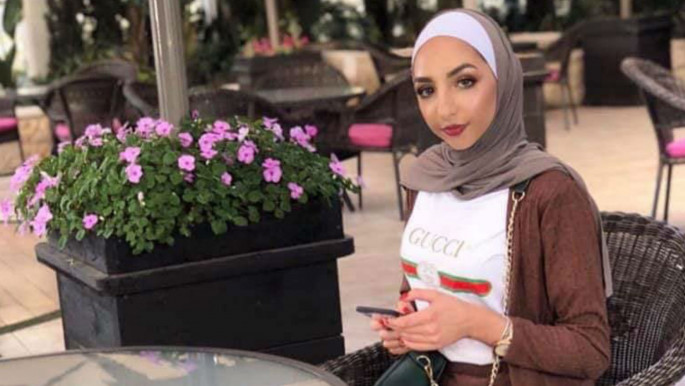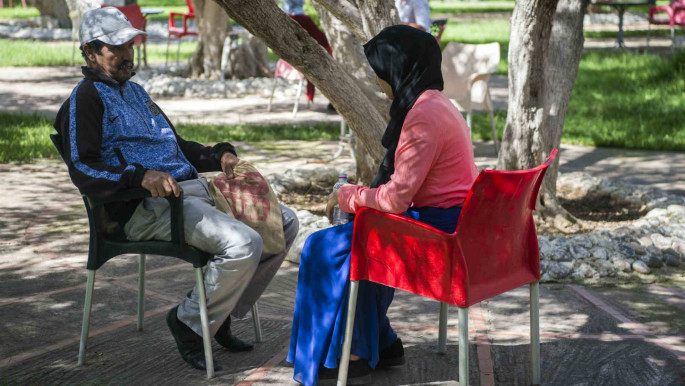'No honour in murder': Honour killings are a problem and we know it
Ghrayeb, 21, made international headlines this week after reports slowly seeped from Bethlehem, Palestine, revealing daunting details of her death in her home town.
The reports first emerged on Twitter on Friday evening and claimed the young Palestinian entrepreneur, who had amassed thousands of followers on Instagram for her makeup talents, had been killed by her male family members in what many described as an honour killing.
Ghrayeb allegedly provoked the fury of her brother, father and other male relatives for posting a video of herself during a chaperoned date with her fiancé online.
The video was reportedly seen by Ghrayeb's cousin who shared it with the family. Just hours later, another video surfaced online depicting the moments before Ghrayeb's death where she was heard screaming for her life inside the hospital she was admitted in for treatment after sustaining wounds in an earlier attack at home.
The killing caused uproar across the region and was described by Adalah Justice Project, a Palestinian Human Rights organisation, as "heinous."
 |
|
| Read also: #WeAreIsraa: Outrage as Palestinian woman 'tortured to death' in honour killing |
"Israa was murdered by members of her family after she posted a selfie video of an outing with her fiancé. The crime is being called an 'honour' killing, but this is misleading and false. There is no honour in murder," the group said in a statement, calling for an investigation into the killing.
Within hours of the report, #WeAreIsraaGhrayeb began to trend online with many sharing facts, figures, opinions and even testimonials pertaining to honour killings and domestic abuse, highlighting just how prevalent violence against women is in the region and across much of the world.
What Arabs think
The criminal act of honour killing is one in which relatives kill a family member, most typically a woman, for allegedly bringing dishonour onto the family, shaming its name and reputation among society.
Though it is difficult to locate accurate and up-to-date statistics on the number of honour killings committed in the region, a recent opinions based survey showed what Arabs think of the punitive criminal act in 2019.
The figures, found by the largest and most in-depth survey undertaken of the Middle East and North Africa for BBC News Arabic by the Arab Barometer research network, showed honour killings were considered acceptable by 27 percent of Algerians, 25 percent of Moroccans, 14 percent of Sudanese, 21 percent of Jordanians and 8 percent of Tunisians, Lebanese and Palestinians.
 |
Honour killings were considered acceptable by 27% of Algerians, 25% of Moroccans, 14% of Sudanese, 21% of Jordanians and 8% of Tunisians, Lebanese and Palestinians |  |
The survey questioned more than 25,000 people across 10 countries and the Palestinian territories between late 2018 and spring 2019. Interestingly, it showed a vast increase in respondents that described themselves as non religious, indicating honour killings are not at all a religious issue but a cultural and social epidemic.
Honour killings stem from patriarchal thoughts and ideas that have plagued the world, not just the Middle East, for centuries.
A 2011 World Health Organisation [WHO] study found 38 percent of murders of women are committed by a male intimate partner.
"Men are more likely to perpetrate violence if they have unequal gender norms including attitudes accepting of violence, and a sense of entitlement over women," the WHO study said.
"Situations of conflict, post conflict and displacement may exacerbate existing violence, such as by intimate partners, as well as and non-partner sexual violence, and may also lead to new forms of violence against women," it added.
This was reflected in the Arab Barometer survey, which conducted research in Yemen, Iraq, Libya and Egypt as well as the aforementioned, finding more than 50 percent of respondents in each country maintained that the husband, or a male figure at home, should have the final decision on all family matters.
The statistics, though unfortunate, do little to shock those familiar with the region.
 |
Despite recent groundbreaking and historic developments, the Arab world has a long way to go to achieve true gender equality |  |
Despite recent groundbreaking and historic developments, the Arab world has a long way to go to achieve true gender equality. Patriarchy, misogny and violence against women remains rampant and even those praised for championing women's rights can fall intro the trap of inferiority to men.
Superstar Yemeni-Emirati singer Balqees Fathi received backlash for her comment on the Israa Ghrayeb case, suggesting families, and brothers, should "discipline" their female relatives at home and not in public, as per Ghrayeb's case.
The comments from the young artist came as a shock to many considering her role as Planet 50-50 champion for the Arab States Region, which see's her work with the UN to assist young women and girls in their journey to entrepreneurship in the region.
Outdated laws
 |
|
| Read also: Fighting the system: The teenage Moroccan rape victim who refused to stay silent |
Shocking figures from the Arab Research Centre's Arab Index revealed relatively high percentage of respondents believe a man should hit his wife in "some personal circumstances".
Standing at the top of the list, 45 percent of Sudanese respondents agreed with the statement, shortly followed by Egypt at 41 percent, and Tunisia at 40 percent. In total, a 27 percent average agreed with the statement across the region.
Similarly, 58 percent of respondents in Tunisia said they believed violence against women is rampant in the country, echoing similar sentiments by 44 percent in Lebanon, and 31 percent in Morocco.
Overall, an average of 25 percent of those surveyed across 12 Arab states agreed with the statement, while 38 percent believed violence against women existed to a "certain extent".
But it is obvious that this dated way of thinking is allowed to fester due to weak laws across the Middle East, many of which shun and dismiss the victims in favour of their male attackers.
Laws across the Arab world, or lack thereof, see many victims lose out on, while perpetrators escape, true justice.
 |
It is obvious that this dated way of thinking is allowed to fester due to weak laws across the Middle East, many of which shun and dismiss the victims in favour of their male attackers |  |
"Legislation in place contributes, to a large extent, to building a social awareness that killing under the pretext of honour is acceptable," a 2014 UN human rights report written by Palestinian judge Ahmad al-Ashqar said.
In the aftermath of the Ghrayeb killing, protesters demanded justice for the slain woman in Palestine, shining a light on what they described an outdated legal system and calling on authorities to protect them from gender-based violence.
This urge for structural change across the region was reflected in statistics from the Arab Index, which showed an overwhelming majority agreed to and, in fact, encouraged punitive measures against men who physically abuse or engage with violence against women – signalling a general consensus in hopes for a safer society for women in the Arab world.
Sana Uqba is a journalist at The New Arab.
Follow her on Twitter: @Sanasiino





 Follow the Middle East's top stories in English at The New Arab on Google News
Follow the Middle East's top stories in English at The New Arab on Google News


